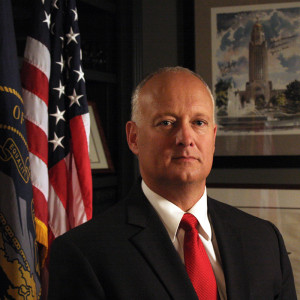Nebraska AG candidates view death penalty differently, but agree it should continue

By Deena Winter | Nebraska Watchdog
LINCOLN, Neb. — While the two nominees for Nebraska’s attorney general differ in how they view the death penalty, both would continue carrying out death sentences if elected.
Republican Doug Peterson and Democrat Janet Stewart were nominated by their parties last month to fill the seat being vacated by Attorney General Jon Bruning. They will be on the ballot in November.
Asked for her stance on the death penalty, Stewart, a Fremont attorney, said as attorney general she would represent the state, “so it’s not really your personal preferences that dictate what you do.”
Doug Peterson
“My role would be representing the state in a matter,” she said. “The morality of the death penalty I think is something that maybe is above my pay grade. I leave that up to faith leaders and professors of ethics and whatnot.”
Peterson, a Lincoln lawyer, said he supports the death penalty in cases where the defendant’s behavior is particularly heinous and shows disrespect for human life.
Oklahoma’s recently botched execution in which the convicted murderer died of a heart attack after an IV line was inserted improperly in his groin, leaked into soft tissue and left him writhing in pain before the execution was halted hasn’t changed their stances.
Nebraska is one of 32 states with a death penalty, but hasn’t had an execution since 1997. After the Nebraska Supreme Court ruled the electric chair unconstitutional in 2008, the state switched to lethal injection, but like other states, Nebraska has had trouble getting access to lethal drugs for executions.
Stewart said public perception of the death penalty is probably changing — particularly after the gruesome botched execution — but it’s up to the Legislature to decide whether to abolish capital punishment. Lawmakers have edged closer to doing just that; last year lawmakers appeared to have enough votes to pass a bill, but not the super-majority required to stop a filibuster.
“Anybody who’s thoughtful is going to see there are a lot of issues that have arisen lately,” Stewart said. “It’s a concerning question. People are concerned about whether innocent people are convicted, botched executions (and) the fact that the state has a real difficulty getting the drugs.”
Peterson said the attorney general is involved in making sure state workers follow a certain medical protocol in carrying out executions to prevent the kind of “terrible circumstances” that occurred in Oklahoma.
“It’s my understanding that they didn’t comply with their protocol,” he said.
The state has had difficulty obtaining lethal injection drugs because death penalty opponents have pressured pharmaceutical companies with threats of legal action, Peterson said, but some states have gotten around that.
“I think that can be overcome,” he said.
The case in Omaha where Nikko Jenkins is accused of killing four Omahans within weeks of being released from a Nebraska prison is a classic example where the death penalty might be appropriate, Peterson said.
“The Jenkins case is probably a good example because you know he did go on a string and it was obvious he had no respect for human life,” he said. “It’s one in which I think prosecutors should have the option.”
Contact Deena Winter at deena@nebraskawatchdog.org. Follow Deena on Twitter at @DeenaNEWatchdog
Editor’s note: to subscribe to News Updates from Nebraska Watchdog at no cost, click here.







